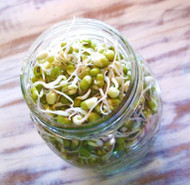Growing Sprouting Seeds
Mother nature is at her most potent at the germination stage with sprouting seeds producing plenty of nutrients to ensure the new seedling plant has the best chance of survival. In the case of sprouting seeds the hopeful little sprouts life is cut short when you gobble him up but his (reluctant) parting gift will be a whole powerhouse of vitamins and minerals to keep you healthy.
Good seeds to try are: alfalfa, aduki bean, cress, fenugreek, mung bean, mustard, and radish. A large glass jar is perfect for growing sprouts and makes the process very simple. Use a porous cloth like muslin to drain the water from jar, see below:
1. measure 2-3 tablespoons into the jar. Obviously it'll vary depending on the size of the jar but the photo opposite should give you a good idea (about 1/4 full).
2. Fill half the jar with water and leave the the seeds to soak for about 10 minutes. If you are using larger seeds like peas or beans you should soak them for about 4 hours, overnight is not necessary.
3. After soaking strap on your muslin to the lid and invert the jar as shown letting the water drain out. Place the jar out of direct sunlight to germinate.
4. Rinse the seeds twice a day as in previous steps always leaving the jar inverted to drain out excess water. The seeds need to be moist but not sitting in water.
5. After 3-5 days the sprouts will be ready, you can leave the jar in the light for a day which will make the shoots green up which increases the nutritional content of your sprouts.
If you want to increase vitamins, especially vitamin C, place the sprouts in sunlight for a half day after they have fully grown. They will green up and turn sunlight into extra vitamins. If in direct sunlight rinse them occasionally to keep them moist. Once grown they can be refrigerated to slow growth and keep them fresh longer. Add sprouts to any salad, sandwich or just eat them fresh. I eat a pile of sprouts with vinegar and oil or other salad dressing.

